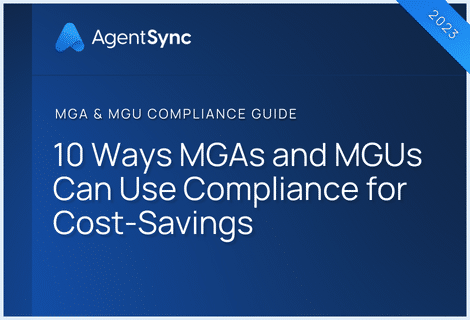

Article key points
- An insurance agent’s license can be suspended or revoked for various reasons, including providing false information, violating insurance laws, committing fraud, or having a felony conviction.
- Some states consider DUI/DWI convictions as felonies and may impact an insurance license, while others have specific regulations and requirements for such cases.
- Failing to pay state income tax or comply with child support obligations can also lead to license jeopardy in many states.
- Reinstating a revoked license depends on the reason for revocation and may involve a written request, additional information, and, in some cases, a new licensing exam.
- Insurance producers must operate in good faith and comply with all applicable laws and regulations to maintain their licenses and protect the integrity of the insurance industry.
Termination of insurance-related licenses – the subject matter is a bit awkward and sure to raise eyebrows as a topic of discourse at company parties. But the reality is some portion of insurance agents will leave the industry every year, and not all of them for sunshiney reasons.
What causes an insurance license revocation?
States licensing insurance agents used to have a variety of ever-changing regulations about what did or didn’t constitute a reason for terminating an insurance producer license. To address this, when the National Association of Insurance Commissioners (NAIC) issued its Producer Licensing Model Act in 2005, Section 12 specifically set out to give states a somewhat standardized way of approaching license termination.
Only 10 states and three territories have not adopted the NAIC Producer Licensing Model Act (PLMA) in some fashion, so while you should be sure to understand the particular and unique regulations that apply to you and your associated agents in all states of operation, this should give you some broad strokes of the rules that apply in most of the country.
Who’s responsible for suspending or revoking an agent’s license?
An agent’s license can be suspended or revoked by a state insurance commissioner or a court judge. Section 12 of the NAIC’s Producer Licensing Model Act lays out 14 reasons a state’s insurance commissioner “may place on probation, suspend, revoke or refuse to issue or renew an insurance producer’s license or may levy a civil penalty…or any combination of actions.”
NAIC’s 14 reasons for license denial, non-renewal, or revocation
Read through the following – generally, the guidelines are self-explanatory, but we’ll call out a few that stand out:
- Providing incorrect, misleading, incomplete or materially untrue information in the license application;
- Violating any insurance laws, or violating any regulation, subpoena or order of the insurance commissioner or of another state’s insurance commissioner;
- Obtaining or attempting to obtain a license through misrepresentation or fraud;
- Improperly withholding, misappropriating or converting any monies or properties received in the course of doing insurance business;
- Intentionally misrepresenting the terms of an actual or proposed insurance contract or application for insurance;
- Having been convicted of a felony;
- Having admitted or been found to have committed any insurance unfair trade practice or fraud;
- Using fraudulent, coercive, or dishonest practices, or demonstrating incompetence, untrustworthiness or financial irresponsibility in the conduct of business in this state or elsewhere;
- Having an insurance producer license, or its equivalent, denied, suspended or revoked in any other state, province, district or territory;
- Forging another’s name to an application for insurance or to any document related to an insurance transaction;
- Improperly using notes or any other reference material to complete an examination for an insurance license;
- Knowingly accepting insurance business from an individual who is not licensed;
- Failing to comply with an administrative or court order imposing a child support obligation; or
- Failing to pay state income tax or comply with any administrative or court order directing payment of state income tax.
Most of the rules in the Producer Licensing Model Act cover the basics – don’t lie, cheat, or steal, don’t coerce or confuse, don’t get in trouble in one state and then just try to move, etc. However, a few bear extra scrutiny.
For instance, rules No. 1 and No. 3 seem to more or less say the same thing at first blush. But No. 1 seems to cover mischaracterizations such as “lies of omission.” This could include instances where you have something – perhaps an arrest record, or a prior slap on the wrist in a different state – that you don’t quite know whether to include an explanation for on your application. You could be unsure, or even just forgetful. Yet, not including a complete or entirely factual application could mean having the state deny you an insurance license (or having an insurance license revoked later).
Rule No. 3, however, deals with out and out fraud and an element of “intentionality.” While No. 1 could mean having your license suspended, revoked, non-renewed, or denied because of a mistake, No. 3 addresses the fact that some people meant to lie and meant to deceive the state in their application. It’s not surprising that a state would revoke an insurance license after learning it was obtained under less-than-honest means.
Surprising reasons agents lose their licenses
With the Producer Licensing Model Act, many of the ways to lose your license are clear: Tricking people into buying insurance or taking their money and using it for your own business or filling your own pockets instead of paying it to the insurance carrier are pretty visibly wrong. But it may surprise you to know in many states (which are responsible for licensing insurance agents), the status of your income taxes or child support could also jeopardize your license.
Additionally, rule No. 6, which may seem relatively straightforward in comparison to others (“having been convicted of a felony”), has a wide number of variations in the states.
Can you lose your insurance license for a DUI?
One particular point of disagreement among the states is how to handle felony convictions for driving under the influence (DUI) or its close relative, driving while intoxicated (DWI). In all states, third offenses for DUI reach the level of felony. Some states, however, exempt this particular felony from consideration in the status of insurance licenses. Other times, states implement extended waiting periods or require explanations and proof that you’re working to change your habits when it comes to DUI and DWI convictions. Additionally, while the model legislation calls out felony convictions, often carriers or states require explanations for arrests or charges regardless of a conviction.
As we said earlier, not all states follow these rules to the tee, and even those that do have variations. So, the way a state like California, which is notorious for its heavy regulations, handles license violations will certainly differ from a state such as Kansas, which often takes a looser approach (although Kansas itself adds two more provisions to the 14 outlined in the NAIC’s model legislation).
Is selling insurance without a license a felony?
It’s certainly illegal to sell insurance without a license in all 50 U.S. states, and in all U.S. territories. Whether it would be considered a felony will depend on the laws of each specific state or territory. Moreover, the crime of selling insurance without a license will almost always prevent you from becoming licensed in the future, as most states prohibit those with criminal backgrounds specifically relating to insurance fraud from obtaining licenses.

Can a revoked insurance license be reinstated?
Yes, but it also depends on why the license was revoked or suspended in the first place. If a state prohibits convicted felons from holding a valid insurance license, then an insurance agent with a felony on their record wouldn’t be able to get their license reinstated. On the other hand, if it’s a matter of child support payments, a producer might be able to get back their insurance license after they’ve cleared up any backlog of debt.
Section 16 of the NAIC’s Producer Licensing Model Act states that a producer may reinstate their insurance license within 12 months of expiration without retaking a licensing exam, as long as they would otherwise be eligible for renewal. And that’s the kicker because if you’ve landed in one of the 14 reasons that could cause a producer to lose their license, it’s likely your license isn’t eligible for renewal. In this case, you need to look at your options for license reinstatement after disciplinary action.
Insurance license reinstatement after disciplinary action
If a producer loses their license because of misconduct, there are two potential ways to get back on the right side of the insurance law: reinstatement or reissuance. License reinstatement means the producer’s previous license is reactivated. License reissuance means they’re issued an entirely new license. Either way, the process of getting a license back isn’t automatic.
How to get an insurance license reinstated
According to the NAIC’s Producer Licensing Model Act, the steps for a producer hoping to get their insurance license reinstated after a disciplinary matter are:
- The producer has to send the insurance commissioner a written request for license reinstatement or reissuance.
- If the producer’s license has been suspended for long enough that the license’s expiration date has passed, the producer is required to apply for a new license (reissuance).
- In this scenario, the producer can’t just pass another licensing exam and get their license back. They have to “include sufficient information to allow the insurance department to determine whether the basis of the revocation, suspension or forfeiture of the applicant’s license no longer exists and whether it will be in the public interest to grant the request for a new or reinstated license.”
- The responsibility for making this case falls on the producer, and in most states they have the right to an administrative hearing if their initial request for license reinstatement or reissuance is denied.
To put it simply, insurance producers whose licenses have been suspended or revoked for one of the 14 reasons listed above (or others added by individual states) have to prove they can be trusted with an insurance license again.
Regardless of how clear and easy to understand any set of rules is on the subject, agents, brokers, producers, agencies, MGAs, and carriers want to be sure everyone in their distribution pipeline is operating in good faith and in compliance with all applicable laws and regulations. The aphorism “one bad apple can spoil the whole bunch” is superappropriate as it pertains to insurance; one person acting outside the law can have far-reaching consequences.To learn specifically how AgentSync helps keep producers compliant, watch a demo today.

